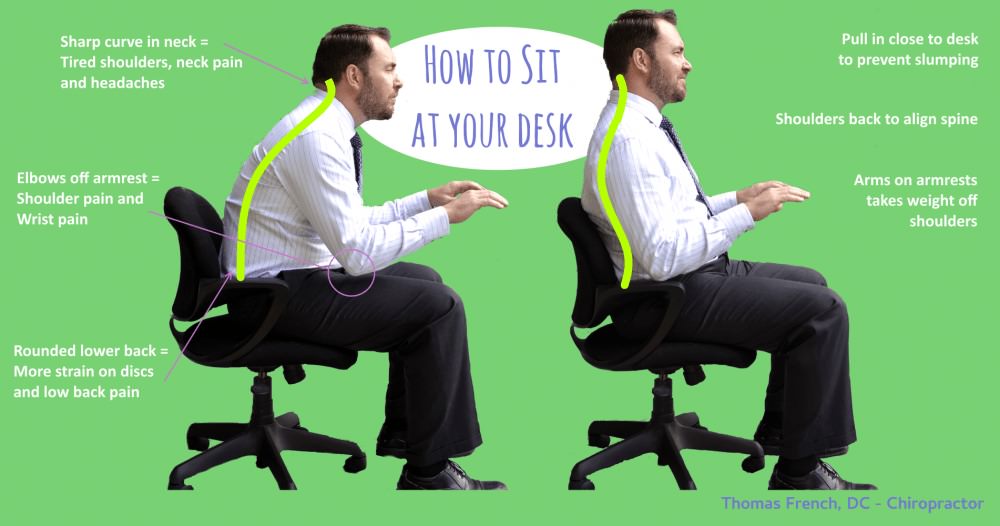How to sit at a desk • How to sit in a car
The Importance of Proper Sitting Posture
Even though we spend years sitting in school and many jobs require us to sit in front of a computer for hours, we never learn the right way to sit. Poor sitting posture can lead to low back pain, neck pain, headaches, and other painful conditions that might be preventable with the correct sitting posture.
Key Elements for Proper Sitting Posture
- Start with the shoulders – The shoulders are crucial for maintaining overall good posture. All the weight of our body falls in front of our spine, requiring back muscles to work constantly to keep us upright. The only option we have for a counterweight is to keep your shoulders pulled back. With the weight of your arms behind your spine, the muscles in your back and neck don’t have to work as hard. Since the spine acts more like a column, the weight is distributed through the skeleton instead of the muscles. If I could only give one piece of advice for the back, this would be it.
- Keep your screen in front of you – It is hard enough to stay in the same position for hours on end without adding a twist into the equation. Keeping your screen off-center from your chair, forcing you to turn your body and head to see it, is a major culprit in sitting pain. Arrange your desk so your monitor is straight in front of you, and raise it or lower it so the top of the screen is at eye-level.
- Don’t overuse your laptop – The proximity of a laptop’s screen to its keyboard is an ergonomic challenge. You can’t help but slump when you lean over to see the monitor and lift up your arms to type. The best solution for posture is to use your laptop sparingly while traveling, and use a desktop at your office. If that is not possible, get a separate screen to plug into at your desk, or a detachable keyboard.
- Your arms need a rest – Whether typing or using the mouse, if your arms are unsupported, they will eventually start to pull on your neck and shoulders. Your chair should have armrests that you can adjust to support your elbows.
- What about a standing desk? – Standing desks are coming into common use recently. I think their benefit lies in the fact that you are changing up your positioning during the day. Standing eight hours a day, every day comes with its own problems. But if you can use a standing desk to alternate with sitting and break up your routine, it could prevent the issues that come with prolonged positioning.
- Take Breaks – Take occasional breaks to reposition yourself and set a reminder to check your posture every hour.
Proper Sitting Posture in the car
Driving involves a different set of considerations for sitting posture since your hands and legs are also active.
- Keep your knees higher than your hips – Adjust your seat to raise the front, preventing your knees from dropping down straight to the pedals. If the knees are lower, the whole weight of the leg pulls the lower back into flexion, and prolonged flexion is bad for your back. Sitting like that for a long time can cause lower back pain and piriformis pain.
- Shoulders back, stomach out – Like at a desk, keeping the shoulders back is primary for good posture. In a car, it is also important to keep your upper back from slumping since car seats are not as supportive as desk chairs. Use the built in lumbar support to keep your back curved, or use a special back support made for cars.
- Rest your head – They call it a headrest for a reason. Driving for a long time with your head held forward can cause upper back pain, neck pain and headaches. If you will be in the car a lot, adjust your seat and headrest so that you can lean your head back comfortably while driving. That is a safer position in a car accident, too, since the head would be pushed by the headrest in a rear end collision instead of slamming back into it.

Benefits of Good Posture
Good posture offers numerous benefits, including decreased pain, improved breathing, and a better appearance. You can improve your posture by strengthening postural muscles, adjusting your spine for flexibility, and being mindful of your habits. If you have questions, email Dr. French or click below to make an appointment at our Norwalk, CT office for a full evaluation.
